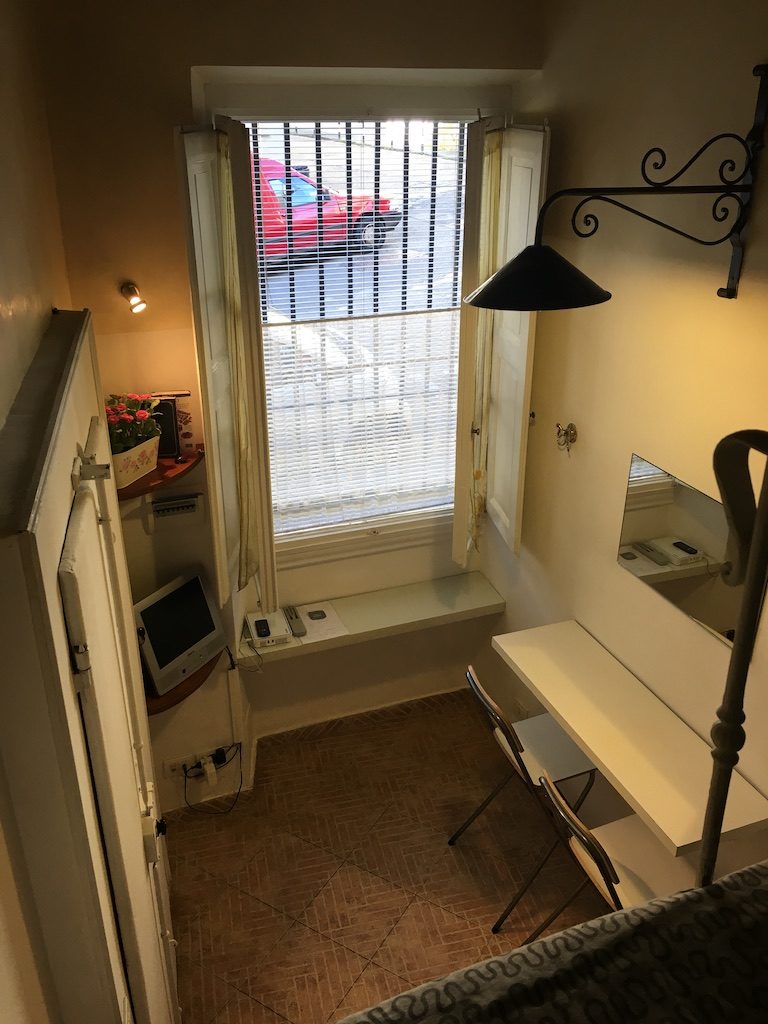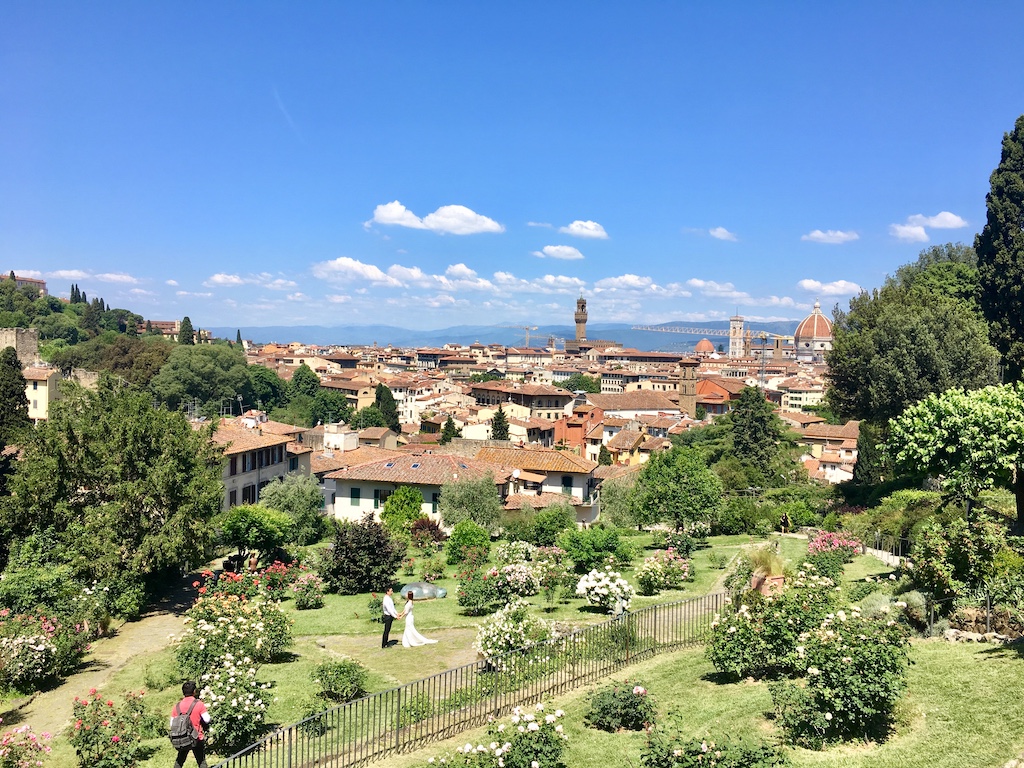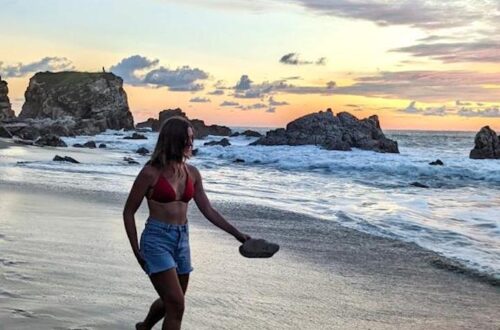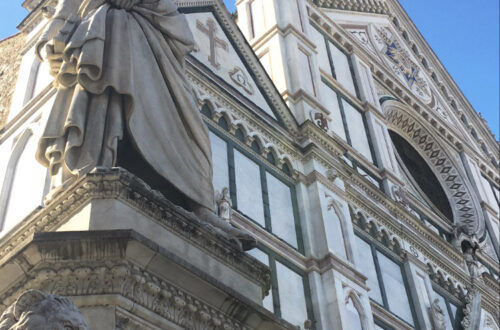Nine steps long and four steps wide. I measured it again just to be sure. Yes, that was right. My apartment was nine steps long and four steps wide at the widest point. Two steps wide in the kitchen, if you would be so generous as to devote that word to my countertop with two burners and a toaster.
After graduating from college, I spent five weeks in Florence, Italy, in an apartment that was roughly the size of a walk-in closet. It was rather tiny, and the amenities were what many would call inconvenient.
I was absolutely in love with it.
My little home was on a hill that I pegged to be at about a 30-degree incline. For the first week, I huffed and puffed a little on the way up, but soon it felt like nothing. What hill? Oh, this little thing? It’s just a driveway, really.
My Airbnb host promised I would have Wi-Fi so I could communicate with my family and do some writing at night. It didn’t work. Ironically, I had to climb further up the hill, to a gorgeous rose garden behind my house, just to check my messages.
My little place had a television with a screen roughly the size of a greeting card. The little guy provided about 24 channels. Now, all of the channels showed the exact same program, but I could choose which channel I preferred to watch.
I had a double window that looked out onto the street. A lace curtain allowed me to see without being seen. I could listen to the passersby as they climbed my driveway, which was part one of a hefty trek up to a popular, panoramic piazza. Most of them were tourists, many Americans, moaning and groaning about the incline, the heat or arguing with their co-travelers about directions. “It’s this way, Judith!”
I often contemplated jumping in on conversations. “He’s right, Judith. It is that way.”

With no air conditioning, I had to choose between leaving the windows open or living in what would probably be a standard sized sauna. As a result, I often found ants crawling around my sink, and my mosquito friends never failed to visit me while I slept. “Only six bites last night? Hey, not bad!”
My washing machine grew so loud during the spin cycle that I was sure it would burst out of the closet and attack me. And don’t even get me started on the dryer. Ha just kidding. There was no dryer. A dryer is an anomaly in Italy; hence, the clothes pinned up on the narrow streets, spanning window to window.
When I was out walking, I often wondered whether laundry customs influenced the locals’ social lives. “Barbara, is that a new top you’ve got hanging up below the left window? Could I try it on? I’ve got a hot date with Lorenzo tonight.”
When I took a shower, I knew that after a song and a half played on my phone, the water would quickly turn lukewarm and then give way to an icy spray. Challenge accepted. Five-minute showers became the norm.
While cooking dinner, I often wondered to myself whether “al dente” pasta was created because the stoves take so long to cook the noodles. “Okay, that’s good enough, I’m hungry.”
After all of my run-ins with a slightly less convenient way of living, I started to wonder about the concept of “having.” The way the connotation around the word changes from person to person, place to place, country to country.
It seemed to me that maybe we’re taught to value having “more” in America. To measure our success, our happiness, by the things we own. The type of car we drive. The size of the houses we live in. The number of channels on our plasma screen TV. The brands of our clothing. The volume of our washing machines.
My normal life in the states started to seem like it was pumped full of too much “material.” Suddenly, the way I’d been living seemed over-complicated, excessive, suffocating.
From what I gathered, the majority of Italians tend to have fewer possessions in general: smaller living spaces and fewer pieces in their wardrobes.
And hey, maybe they’d like to have more. Maybe some of them daydream about life in America the way I daydream about life in a Tuscan villa. Maybe the grass is always greener. But I couldn’t help thinking, that at least for 22-year-old me, having less is somewhat liberating.
From my experience in my steamy, buggy, shoebox, I realized how little I really needed to get by.
I only had one channel so I didn’t waste 20 minutes flipping through the TV Guide, deciding what to watch. I hardly turned it on at all.
I didn’t need to take long, luxurious showers. I cleaned what needed to be cleaned and got on with my day.
Walking became my only method of transportation. I averaged about eight miles a day, which meant that I could consume a daily gelato without seeing the results on my waistline. I didn’t have to spend an hour on the treadmill everyday to maintain my figure. I forgot calories for once in my life.
I looked forward to walking the mile to the grocery store every other day. While I shopped, I reminded myself to buy only what I needed because I was limited to my own upper body strength. Then, I laughed at myself — as did the locals — as I struggled to carry my bags down the street anyway.
All of these things that I would have thought of as troublesome back home simply amused me. I didn’t mind. I was in Italy. All I wanted was to exist there, to breathe the air, to walk the streets, to practice speaking bad Italian in cafés.
It’s easy to get tied up in material possessions, but when you strip them away, you remember what really makes you happy doesn’t come from a mega-mart or a catalog. Experiences, people, places, beauty, art, adventure. These are the things we live for.
Maybe what you want most out of life is to live in a place that makes you feel alive. Maybe you’re dying to be a musician, an artist, a stand-up comedian. Maybe you really don’t care where you are or what you do as long as a certain person is by your side.
But when you strip life of the frills and drill down the to core of what you truly want, the rest seems superfluous.
You don’t care so much if your toilet overflows and soaks the bathroom first thing in the morning. I know I didn’t. In fact, it made me laugh out loud.
Anyway, who cares? I’m going to get lost in the Uffizi.
This essay originally appeared in The Republic newspaper on August 3, 2017.




